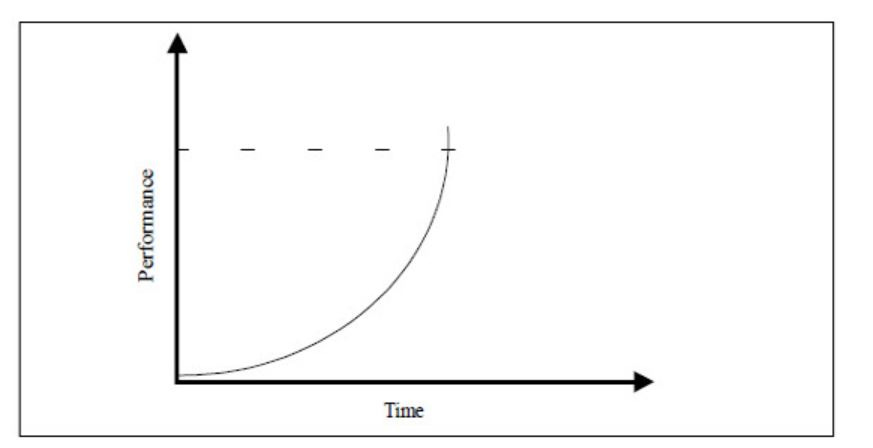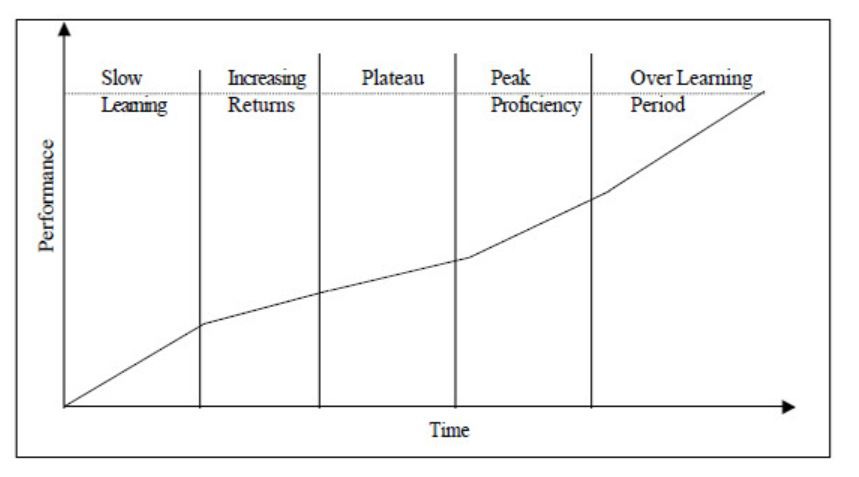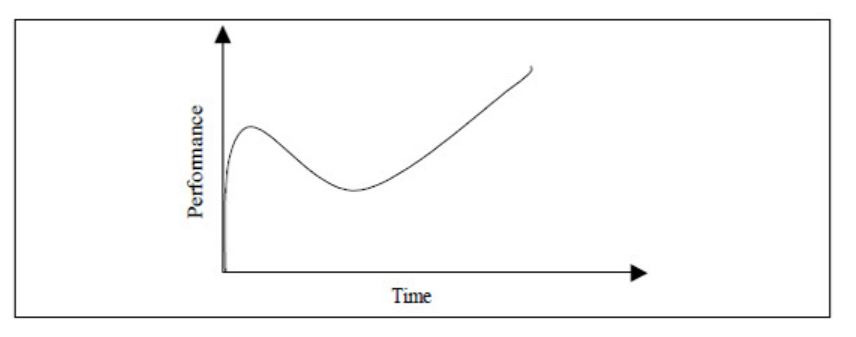Staying on the Path - Part 1
Learning Curves - they're probably not what you think they are...
The Blue Belt Blues
A couple of weeks ago, a blue belt friend of mine reached out after one of my early posts to thank me for the motivation tips in this substack.
The message contained one line that I felt held a mirror up to my blue belt years. It said:
“I struggle with BJJ all the time. I’ve been turning up 3 times a week to Jiu Jitsu for a few years and still feel like I’m not achieving anything.”
How many times have we said this to ourselves?
The blue belt blues are a real thing which Corey Kuropas captured very accurately in his 2016 article of the same name. For his take on it, you can read it here.
But this frustration is not solely a BJJ phenomenon. You’ll hear the same in sport, music, learning a language, even apprentices say it when they make basic mistakes on the job. “I should be better by now.”
So why do we like to flagellate ourselves about our lack of progress in something we love? Or, more simply, why do you feel like you suck more just when you’re getting better at something?
We’re all looking for that magic bullet to solve that one issue of our motivation blues. But I’d like to propose that it’s a dilemma with two horns and I’d like to look at each of them: learning curves (the mental) and homeostasis (the physical), that I’ll look at in part 2 of this substack.
Learning Curves
The term learning curve is one of the most misleading expressions in education because as soon as you hear it, you imagine this:
This is a perfectly accurate learning curve. If you experienced it in BJJ, then you showed up on the first night. You got owned. You didn’t know if you had to bow or line up. After this slightly slow start, by the third week you had two submissions and a takedown. By the end of three months nothing could stop you. Right now you’re signing up for Polaris.
Or maybe you imagine this as your learning curve:
This is also perfectly accurate learning curve and something more like we imagine in BJJ. You start learning some techniques, you plateau a little, you have a breakthrough, you learn a bunch more, plateau, breakthrough, then someone gives you a black belt. Awesome.
The only problem is, for a hell of a lot of the population, in a bunch of different skill acquisitions (not just BJJ), the curve looks more like this:
And this is a curve that will repeat over and over in your skill acquisition journey. And no one wants to talk about it.
I’m not saying this is definitely your learning curve. But I’ll tell you right now that it is mine and I have have seen it more commonly than the other two curves in anyone I’ve trained with. And if you want to avoid those blue belt blues in white, blue, purple, brown and black flavours, you need to look at the centre of that curve and accept one important fact.
You…will…get…worse.
Sometimes, you’re going to be worse than you were previously. Sometimes a plateau isn’t a flat spot between breakthroughs. Most of the time it is. But sometimes, and (thankfully) only sometimes, learning a new technique or position is going to mess with your game. Or confuse you. Or you’re going to stop doing that awesome gift wrap that you catch everyone with to try working on your DLR guard for a while. And you will be worse than you were yesterday.
The problem is that if we see that single plot point on the graph, we start looking at the time we’ve devoted, we measure ourselves against other people on the mat and we tell ourselves that this is as good as we’ll ever be.
And it will be. If you stop.
My Blues and My Turning Point
Early in my grappling journey, as a blue belt, I was exactly at the watershed moment of whether I would spend a few more years struggling at BJJ or give it away. It was a classic blue belt blues stage. If you want to know what that looks like, I have a picture:
Well, this was from another moment in my BJJ career but you (literally) get the picture. Sometimes your lips match your belt.
But during this watershed time I had the opportunity to attend a seminar with one of the original heroes of the sport, Carlos Machado. And after the seminar finished, I went outside to get something from my car (I think it was his book for him to sign) and Carlos stepped out at the same time to facetime with his wife. We just happened to walk back inside together (I promise I wasn’t stalking him) and he struck up a conversation that opened my floodgates of frustration.
The conversation went something like this:
“I’m really struggling in my game at the moment. Tell me professor, you’re the smallest of your five brothers, aren’t you?”
“Yes I am.”
“And you’re the oldest of your five brothers.”
“Yes I am.”
“So when you’ve got Rigan crushing you or Jean-Jacques or Roger zipping around athletically, how do you keep fighting? Don’t you want to just quit?”
[Now bear in mind, when the Machado brothers - pioneers of jiu jitsu - get together, they don’t use the timer for rounds. They may roll for 30 minutes each round, each brother.
Carlos looked at me very earnestly and I’ll be forever grateful for what he said because it stuck with me to this day:
“It’s hard work man. Some days it’s so hard but when you’re out at sea, and you’re miles from land, you’ve got a choice. You can stop swimming or keep swimming. If you stop, you know exactly where the journey will end. But if you keep going, things may just get better.”
I know it’s nothing you haven’t heard a hundred times before. We all look for motivation when we need it. We don’t all get it from Coral Belt 8th degree grand masters that taught Chuck Norris. Most of the time it’s from our mat buddies and from a meme that we see on facebook that has a Peaky Blinder or John Wick saying something tough. But the sentiment is the same.
You know how far you’ve come. Whatever you know now can be your stopping point.
But you don’t know how much farther you can go.
And if you’re feeling like you’re in a trough and you’ll never get out, make sure you’re not judging your progress by the wrong learning curve.
If you liked this post or have something to add about learning curves or your fight against the Blue Belt Blues (at any rank), please feel free to add a comment or share/re-post on your social media.









Thanks for raising this topic Scott especially the fact that the feeling of conscience incompetence never seems to go away! I personally have got a lot of value looking at the Dunning-Kruger effect, especially the metacognition involved in evaluating your own competency. It seems it's possible to both wildy overestimate your competence in the early stages of skill acquisition and also wildly underestimate your competence later. That is, all things being equal, the external marker that is the belt accurately represents the skill set of the belt holder, regardless of how you might feel about it from day to day! Comparing yourself to your training partners doesn't help - as a wise man once said to me - we're all on the same elevator, only those further up started earlier. I could go on - why some people seem to get better faster, while others grind away in the minor leagues for years. But I will leave you with a quote from Judo founder Jigaro Kano that you've probably heard but is worth recalling: “It is not important to be better than someone else, but to be better than yesterday.”